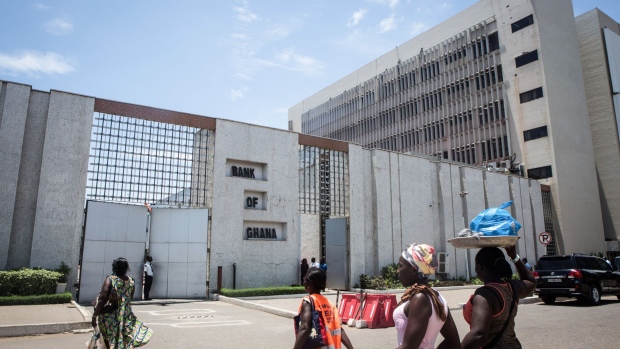Feb 3, 2023
Ghana to Securitize $3.3 Billion in Central Bank Loans
, Bloomberg News

(Bloomberg) -- Ghana plans to convert an estimated 40 billion cedis ($3.3 billion) of loans owed to its central bank into bonds, making it the single biggest holder of domestic government securities and exposing it to an ongoing debt restructuring, according to people familiar with the matter.
The bonds, due to be issued by the finance ministry, will also cover interest owed to the Bank of Ghana, said the people, who asked not to be named because they’re not authorized to speak publicly on the matter. The people didn’t provide details on a timeline for the securitization, but Ghana is seeking to conclude restructuring of public debt this quarter with a view of securing IMF board approval by the end of March.
The securitized central bank loan would be added to list of domestic debt under restructuring, the people added.
A central bank spokesperson declined to comment when reached by phone. A spokesperson for the finance ministry didn’t immediately respond to a call and text message seeking comment.
The new bonds would bring the central bank into Ghana’s ongoing debt restructuring process, under which it is asking investors to swap out 137.3 billion cedis ($11.2 billion) worth of local government securities into new notes with less attractive terms. The voluntary exchange has a Feb. 7 deadline.
The restructuring is a key condition to qualify for a desperately needed $3 billion bailout from the International Monetary Fund. But the IMF has also urged Ghana to stop borrowing from the central bank in order to secure the bailout, Bloomberg reported earlier this week. The government’s debt to the central bank has ballooned in the past year, as investors’ appetite for local bonds dimmed.
The country has also been shut out of international markets after suspending interest payments on $13 billion of eurobonds.
The people noted that under Ghanaian regulations, Section 30 of the Bank of Ghana Act permits the central bank to lend to the government. But if repayment is “unduly delayed, the Bank may transfer the debt to the public through the sale of treasury bills,” the Act says.
Securitizing the loans would head off the central bank issuing treasury bills to recoup its money.
Ghana’s government debt reached 575.7 billion cedis ($47 billion) at the end of November 2022, while public debt stood at an estimated 105% of gross domestic product, a figure the country hopes to reduce to 55% by 2028. Besides restructuring local bonds, it is also in talks to restructure bilateral and external debt.
©2023 Bloomberg L.P.






